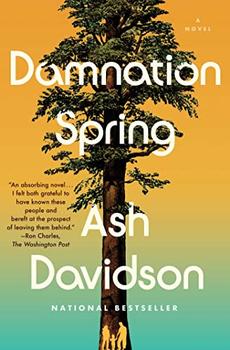Summary | Excerpt | Reading Guide | Reviews | Beyond the book | Read-Alikes | Genres & Themes | Author Bio

Flight Behavior allows readers to go inside the southern Appalachian landscape that Barbara Kingsolver has held in a literary embrace over the last few years with works like Prodigal Summer and Animal, Vegetable, Miracle. This time, it's to go into the coarse world of Feathertown, Tennessee, home of Dellarobia, a farmer's wife and young mother. Dellarobia's small world is disrupted when millions of monarch butterflies unexplainably migrate to the region, choosing the family farm as their resting place. The novel that results from this fictional event is an engaging read for armchair biologists, naturalists, and readers who are concerned about climate change.
While Kingsolver's novels have always contained political, environmental and social messages, these messages are rendered with a particularly strong hand in Flight Behavior. Many chapters include long, in-depth explorations of ecological change, biology, lepidopterology (the study of butterflies and moths), and animal behavior. The almost essayistic undertones to each chapter place the novel at a halfway mark between Animal, Vegetable, Miracle, her work of nonfiction, and her previous novels: The Poisonwood Bible, Prodigal Summer, and others. Flight Behavior is a novel, but it has the informative heft and persuasive manner of a work of nonfiction.
This is not to say that Flight Behavior is a thinly veiled diatribe. Kingsolver works her concerns and commentary into a strong, plot-based frame that allows the reader to experience the characters' growth and see them in varying ways. The character of Hester, for example, begins the story as Dellarobia's grumpy, judgmental mother-in-law but she does not stay that way. Though some are borderline stereotypes, there are also dynamic individuals who interact in the dramatically complex ways of family and friends. There are also characters, mostly who play small, supporting roles, that struck me as unique and complex. There is the entomologist graduate student who builds a sweet relationship with Dellarobia's son, and Dovey, a sassy friend who provides comic relief as well as a vivid depiction of a modern, rural southern woman. Kingsolver's ability to so clearly show these somewhat simple characters demonstrating her ecological concerns is masterful, and one of the several consistent qualities in her writing that is worth considerable admiration.
If there is a place where Kingsolver falls short with Flight Behavior, it is through her characterization of Dellarobia and some of the other prominent figures. I occasionally questioned their motivations; for example, what makes Dellarobia sensitive and open-minded to intellectual and scientific concerns when she is surrounded by those who are not; but there is nothing to point to in her life that sets her experience apart from every other Tennessean in the novel?
One noticeable change in Kingsolver's depiction of the South is her liberal use of realism. The world of rural Tennessee is rendered with less tenderness than similar Appalachian locations in Kingsolver's previous novels. This Tennessee is impoverished, deeply conservative, uneducated, and mostly adverse to education. While Kingsolver eventually shows this small town in differing lights, breaking the backwater portrait she begins with, the majority of the novel works to show a community that, when met with strong evidence of climate change, retreats into religion and anti-intellectualism rather than science.
This is perhaps where Flight Behavior succeeds best: it shows the reality of how different social and economic groups in America view global warming, and the implicit danger in all Americans not fully understanding the magnitude and complexity of climate change. Kingsolver speaks to trendy "going green" habits, the failure of poor public schools to teach science, the religious issues surrounding evolution, and the modern-day concerns of rural American farmers. Though the ecological event that drives Flight Behavior is fictional, the concerns that are voiced and demonstrated are very, very real.
Barbara Kingsolver discusses Flight Behavior in the video below:
![]() This review was originally published in The BookBrowse Review in November 2012, and has been updated for the
June 2013 edition.
Click here to go to this issue.
This review was originally published in The BookBrowse Review in November 2012, and has been updated for the
June 2013 edition.
Click here to go to this issue.

If you liked Flight Behavior, try these:

by Ash Davidson
Published 2022
An epic, immersive debut, Damnation Spring is the deeply human story of a Pacific Northwest logging town wrenched in two by a mystery that threatens to derail its way of life.

by Jeff VanderMeer
Published 2022
From the author of Annihilation, a brilliant speculative thriller of dark conspiracy, endangered species, and the possible end of all things.
Your guide toexceptional books
BookBrowse seeks out and recommends the best in contemporary fiction and nonfiction—books that not only engage and entertain but also deepen our understanding of ourselves and the world around us.